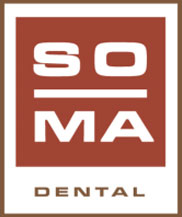5 Common Signs You Might Need TMJ Treatment in San Francisco

If you're dealing with discomfort in your jaw or experiencing frequent headaches, you might be suffering from a TMJ (temporomandibular joint) disorder. The temporomandibular joint connects your jawbone to your skull and plays a key role in everyday activities like talking, chewing, and yawning. TMJ disorders can cause significant discomfort and affect your quality of life.
In a previous blog, we discussed TMJ disorders, including their symptoms, causes, and treatment options. In this blog, we'll focus on five common signs that indicate why you might need TMJ treatment.
Signs You Need to Seek TMJ Treatment in San Francisco
Dentists often find it challenging to pinpoint the exact cause of a patient’s TMD, as it typically results from a combination of factors such as genetics and jaw injuries. If you experience the following symptoms, it may indicate a TMJ disorder.
-
Persistent Jaw Pain or Discomfort:
One of the most obvious signs of a TMJ disorder is constant jaw pain or discomfort, especially around the joint area. This pain might feel like a dull ache or sharp, intense discomfort. Many people mistake this pain for toothache, but if it persists and spreads to the surrounding areas, it could be due to a TMJ disorder. If you're experiencing chronic pain, visiting a dentist near you in San Francisco who specializes in TMJ disorders is crucial for proper diagnosis and treatment.
-
Clicking or Popping Sounds:
Do you hear a clicking, popping, or grating sound when you open and close your mouth? This is a common symptom of TMJ issues and can be caused by the joint's disc shifting out of place or abnormal movement of the jaw muscles. While occasional clicking isn’t always a cause for concern, frequent sounds combined with pain or discomfort should not be ignored. An expert in TMJ treatment San Francisco can evaluate these symptoms and determine the best treatment plan to ease the discomfort.
-
Difficulty Opening or Closing Your Mouth:
If you've ever experienced difficulty opening your mouth wide or felt like your jaw gets "stuck," this could indicate TMJ dysfunction. This limited range of motion may make it hard to eat, talk, or even yawn without feeling pain. Ignoring this symptom could lead to more severe complications over time, so seeking immediate treatment from a dentist in San Francisco is essential to restore normal function to your jaw.
-
Frequent Headaches or Migraines:
Frequent headaches or migraines that occur in the morning or after long periods of jaw activity, such as talking or chewing, can be linked to TMJ disorders. The muscles around the jaw can become tense or inflamed due to misalignment, leading to tension headaches. If your headaches persist even after trying traditional remedies, consulting a dentist for TMJ evaluation can help determine if your jaw is the source of your pain.
-
Earaches or Ringing in the Ears:
TMJ disorders can sometimes mimic ear issues, leading to earaches, tinnitus (ringing in the ears), or a feeling of fullness in the ear. This happens because the temporomandibular joint is located near the ears, and dysfunction in this joint can lead to referred pain in the ears. If you've been experiencing ear-related symptoms without any ear infections or other causes, it might be time to explore TMJ treatment in San Francisco.
Conclusion:
If you're experiencing any of the signs mentioned, it's essential to seek professional help. Dr. Nigel Suarez offers expert TMJ treatment in San Francisco, providing personalized care to alleviate discomfort and restore proper jaw function. Don’t wait to address your symptoms—schedule a consultation today by calling (415) 964-4683 and take the first step towards relief and improved well-being.






